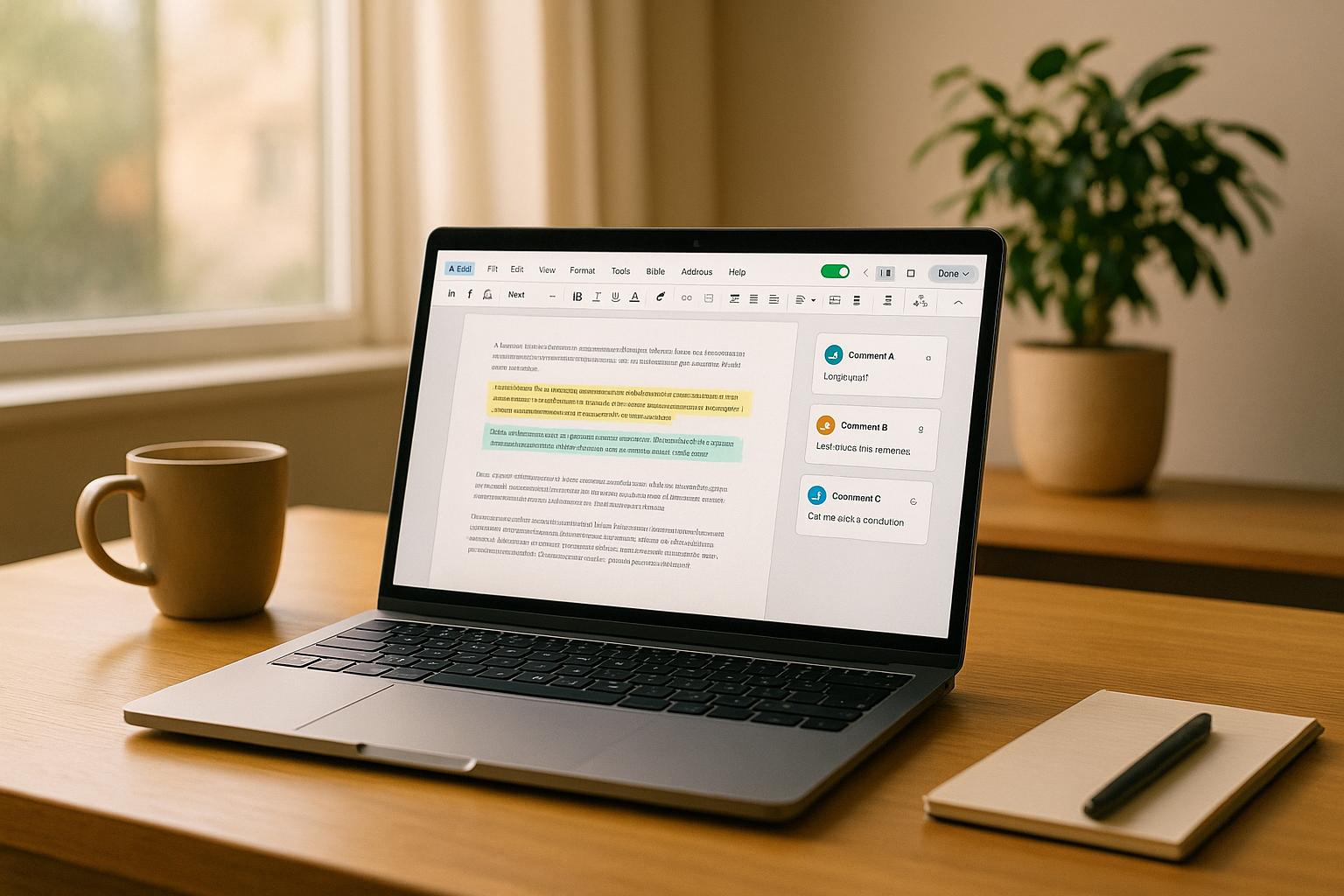Circular economy consulting is booming, with firms helping businesses reduce waste, cut costs, and meet growing consumer and regulatory demands. Companies like PwC, BCG, Bain & Company, and EY are driving large-scale transformations, while boutique firms like GATE C and Oakdene Hollins offer tailored solutions. Whether you need global reach or niche expertise, these firms provide tools, strategies, and measurable outcomes to transition from linear to circular models.
Key Highlights:
- Global Leaders: PwC, BCG, Bain, EY, and KPMG excel in scaling solutions for multinational corporations.
- Boutique Specialists: GATE C, Oakdene Hollins, and Circle Economy focus on niche, hands-on projects.
- Digital Tools: Platforms like BCG’s Circelligence and PwC’s analytics optimize resource use and track progress.
- Industry Focus: From manufacturing to consumer goods and energy, these firms address sector-specific challenges.
- U.S. Expertise: Firms align strategies with American regulations and market conditions, ensuring compliance and impact.
Quick Comparison:
| Firm | Strengths | Industries Served | U.S. Presence |
|---|---|---|---|
| PwC | Data-driven strategies | Manufacturing, Retail | Strong |
| BCG | Proprietary tools (Circelligence) | Consumer Goods, Automotive | Extensive |
| Bain & Company | Circular business models | Energy, Technology | Broad |
| EY | Performance measurement | Finance, Public Sector | Significant |
| KPMG | ESG integration | Manufacturing, Energy | Comprehensive |
| GATE C | Circular value mapping | Logistics, Food Packaging | Limited |
| Oakdene Hollins | Closed-loop systems | Packaging, Manufacturing | Moderate |
| Circle Economy | Collaborative frameworks | Textiles, Construction | Growing |
Whether you're a large corporation or a smaller business, selecting the right partner depends on your goals, industry, and scale. Start with a pilot project to test their expertise and fit for your needs.
Leading the Way on Circularity
1. PwC
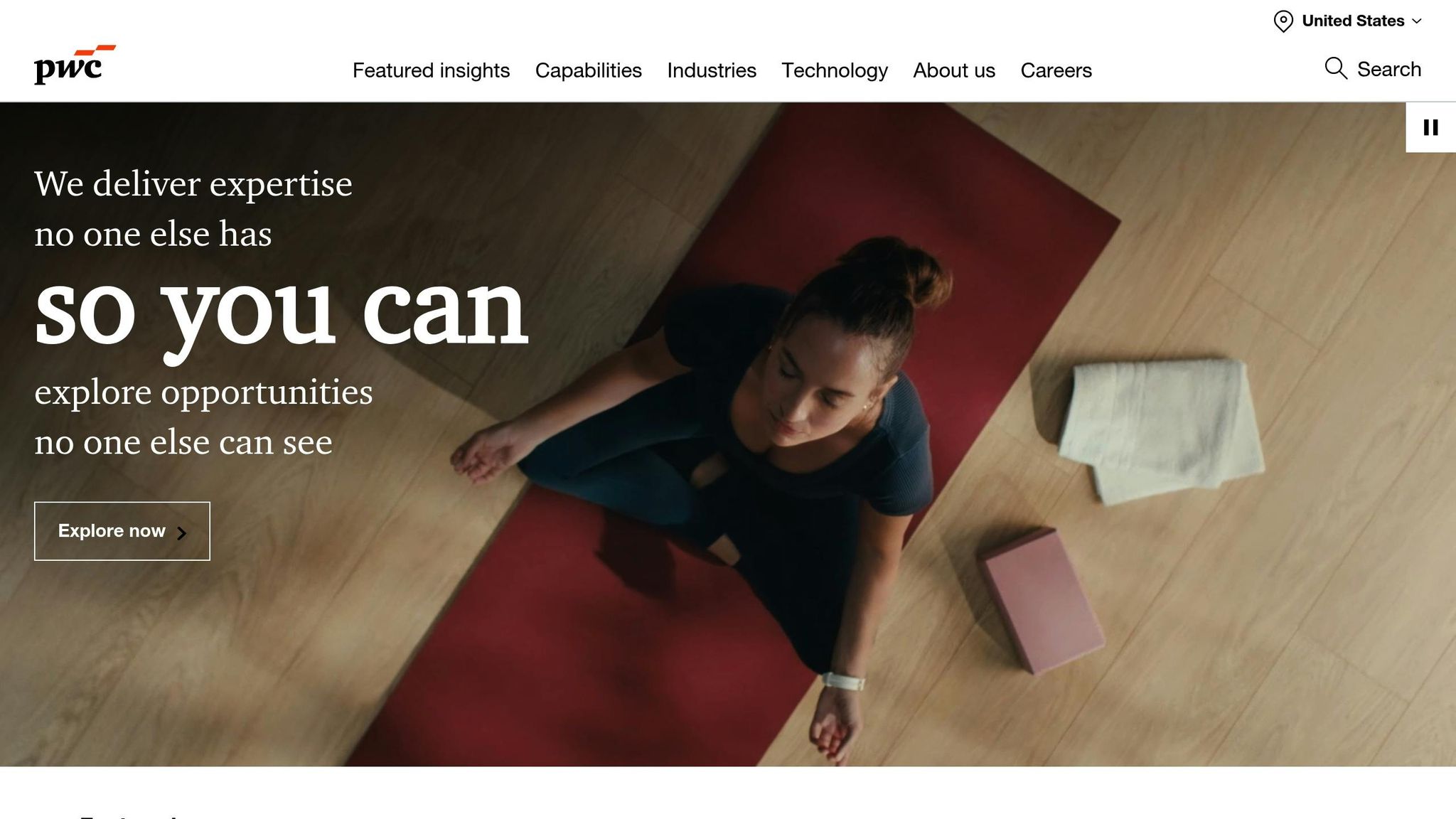
PwC has long been a leader in consulting, and its expertise in the circular economy builds on decades of experience in business transformation. The firm combines its traditional management consulting strengths with in-depth knowledge of environmental challenges, making it a trusted partner for companies aiming to shift toward circular practices.
Circular Economy Expertise
At the heart of PwC's circular economy work is a data-driven approach that aligns environmental goals with business performance. Using advanced analytics and benchmarking tools, PwC helps clients measure progress and assess return on investment. Their expertise spans resource efficiency, circular business model design, and sustainability reporting that meets both regulatory standards and investor demands. By integrating circular economy principles into broader ESG and net-zero strategies, PwC positions sustainability as a comprehensive business transformation rather than a standalone effort.
The firm focuses on practical solutions like waste reduction, material reuse, and uncovering new revenue opportunities. These strategies often deliver both environmental and financial gains. For instance, in 2024, PwC collaborated with a leading U.S. consumer goods company to revamp its packaging for circularity. This project led to a 25% reduction in virgin plastic usage and the creation of a closed-loop recycling program that diverted over 10,000 tons of waste from landfills within the first year. The initiative also involved digital tracking of material flows and close collaboration with suppliers to ensure the system worked seamlessly across the supply chain.
Industry Focus Areas
PwC tailors its circular economy solutions to key sectors, including manufacturing, consumer goods, retail, technology, and energy. Each industry presents unique challenges, and PwC adapts its strategies accordingly. For manufacturers, the focus is on creating closed-loop production systems and optimizing supply chains. In retail, the emphasis shifts to packaging redesign and reverse logistics programs.
As of 2025, PwC has supported over 200 circular economy projects worldwide, spanning diverse industries and regions. In the technology sector, they’ve guided electronics companies in setting up take-back and refurbishment programs. Their energy practice concentrates on integrating renewable resources and implementing waste-to-energy solutions.
PwC’s work with consumer goods companies has been particularly impactful, especially as these businesses face growing regulations around packaging and product lifecycle management. By optimizing supply chains, PwC has helped clients cut material costs by up to 30% and boost recovery rates by 20% - a clear win for both the bottom line and sustainability goals.
Geographic Presence
Operating in more than 150 countries, including key locations across the U.S., PwC provides both local expertise and global coordination for multinational circular economy initiatives. Their U.S. teams are well-versed in navigating the country’s regulatory landscape, including EPA guidelines and state-level programs that offer funding and incentives for businesses adopting circular practices.
This localized knowledge is especially valuable for companies needing to connect with regional stakeholders, suppliers, and partners. PwC’s American consultants are skilled at aligning circular economy strategies with federal environmental regulations and leveraging regional opportunities.
Implementation Support
PwC offers comprehensive support throughout the implementation process, from feasibility studies and pilot program design to change management and performance monitoring. Their hands-on approach includes creating actionable roadmaps, defining key performance indicators, and seamlessly integrating circular solutions into existing operations.
Training and capacity-building are also central to PwC’s methodology. They work closely with clients to launch pilot programs, scale successful initiatives, and maintain continuous improvement processes that adapt to evolving market and regulatory conditions.
PwC’s digital tools play a crucial role in tracking resource flows in real time, enabling adjustments that deliver measurable outcomes. By providing clear insights and tangible results, PwC ensures that businesses achieve their circular economy goals while keeping stakeholders and investors informed.
2. Boston Consulting Group (BCG)

Boston Consulting Group approaches the circular economy as a transformative shift in business operations, not just a standalone initiative. Through its digital platform, Circelligence, BCG integrates sustainability into the core of business strategies, aiming to deliver both environmental benefits and competitive advantages.
Circular Economy Expertise
At the heart of BCG's circular economy efforts is Circelligence, a proprietary platform that helps companies analyze resource flows, pinpoint opportunities, and implement circular strategies. This tool provides measurable metrics to track progress, combining strategic insights with operational know-how and advanced analytics. BCG's approach emphasizes resource efficiency, waste reduction, and closed-loop systems, offering tailored solutions to meet the unique needs of each business. The team includes specialists in sustainability, engineering, and supply chain management, who stay informed on emerging research, industry trends, and regulatory changes. This ensures that BCG's recommendations are grounded in evidence and designed for the future.
Industry Focus Areas
BCG customizes its circular economy strategies for industries like manufacturing, consumer goods, automotive, energy, and technology. In consumer goods, for example, BCG worked with a major company to redesign packaging to be fully recyclable, creating new revenue streams while cutting waste. In the automotive sector, the firm helped establish remanufacturing programs that reduced material costs and carbon emissions. For the energy industry, BCG focuses on resource recovery and waste-to-energy solutions, aligning these efforts with broader sustainability objectives. Each project is supported with change management and stakeholder engagement strategies tailored to the specific challenges of the industry.
Geographic Presence
BCG's extensive U.S. presence, combined with international coordination, allows it to deliver solutions that align with local regulations and market dynamics. U.S. offices collaborate with global teams to ensure strategies are relevant to American businesses, taking into account regional regulatory requirements and market conditions. This localized expertise ensures smooth execution of circular economy transformations tailored to specific business needs.
Implementation Support
BCG offers comprehensive support throughout every stage of the circular economy transformation. From initial assessments and strategy development to pilot programs and full-scale implementation, the firm provides hands-on guidance. This includes stakeholder engagement, change management, and integrating circular practices into daily operations. BCG uses lifecycle assessment tools and dashboards to track key metrics like waste reduction, resource productivity, and carbon footprint improvements. By creating detailed roadmaps and measurement frameworks, BCG ensures that clients achieve measurable environmental and financial outcomes, moving beyond strategy to deliver real-world results.
3. Bain & Company
Bain & Company is at the forefront of helping organizations shift toward more resource-conscious operations, embracing the principles of the circular economy. With offices in 65 cities across 40 countries, Bain combines global expertise with local market understanding to create solutions that align environmental goals with business priorities. Let’s dive into how Bain approaches this transformation through its expertise, industry-specific strategies, global reach, and hands-on support.
Circular Economy Expertise
Bain specializes in developing circular business models that minimize waste and make the most of resources. By rethinking supply chains as closed-loop systems, the firm helps businesses reduce waste and extend the lifecycle of their products. Bain also emphasizes service-based models that encourage reuse and sustainability. Using data-driven metrics, they track and deliver measurable outcomes like cutting waste, improving resource efficiency, reducing costs, and lowering carbon emissions.
Industry Focus Areas
Bain tailors its strategies to address the unique challenges faced by industries such as manufacturing, consumer goods, retail, energy, and technology. These sectors often grapple with high levels of resource consumption and waste. Bain’s approach includes implementing closed-loop production systems that reduce reliance on raw materials and maximize resource recovery. For consumer goods companies, Bain develops strategies that build circular value chains, improving both environmental outcomes and business performance.
Geographic Presence
In the United States, Bain leverages its extensive network to deliver solutions tailored to local regulations, market conditions, and supply chain realities. This localized approach ensures that circular economy initiatives are practical and actionable for U.S.-based businesses. Additionally, Bain’s global presence enables it to meet the needs of multinational corporations and regional businesses, offering a balanced approach that works across diverse markets.
Implementation Support
Bain offers comprehensive support to guide organizations through every step of their circular economy journey. From initial assessments to strategy execution and performance monitoring, Bain addresses common hurdles like resistance to change and skill gaps. Through change management and targeted training programs, the firm fosters collaboration across teams and sets up clear frameworks for tracking progress. This ensures that circular initiatives not only deliver measurable business results but also contribute to long-term environmental improvements.
4. EY
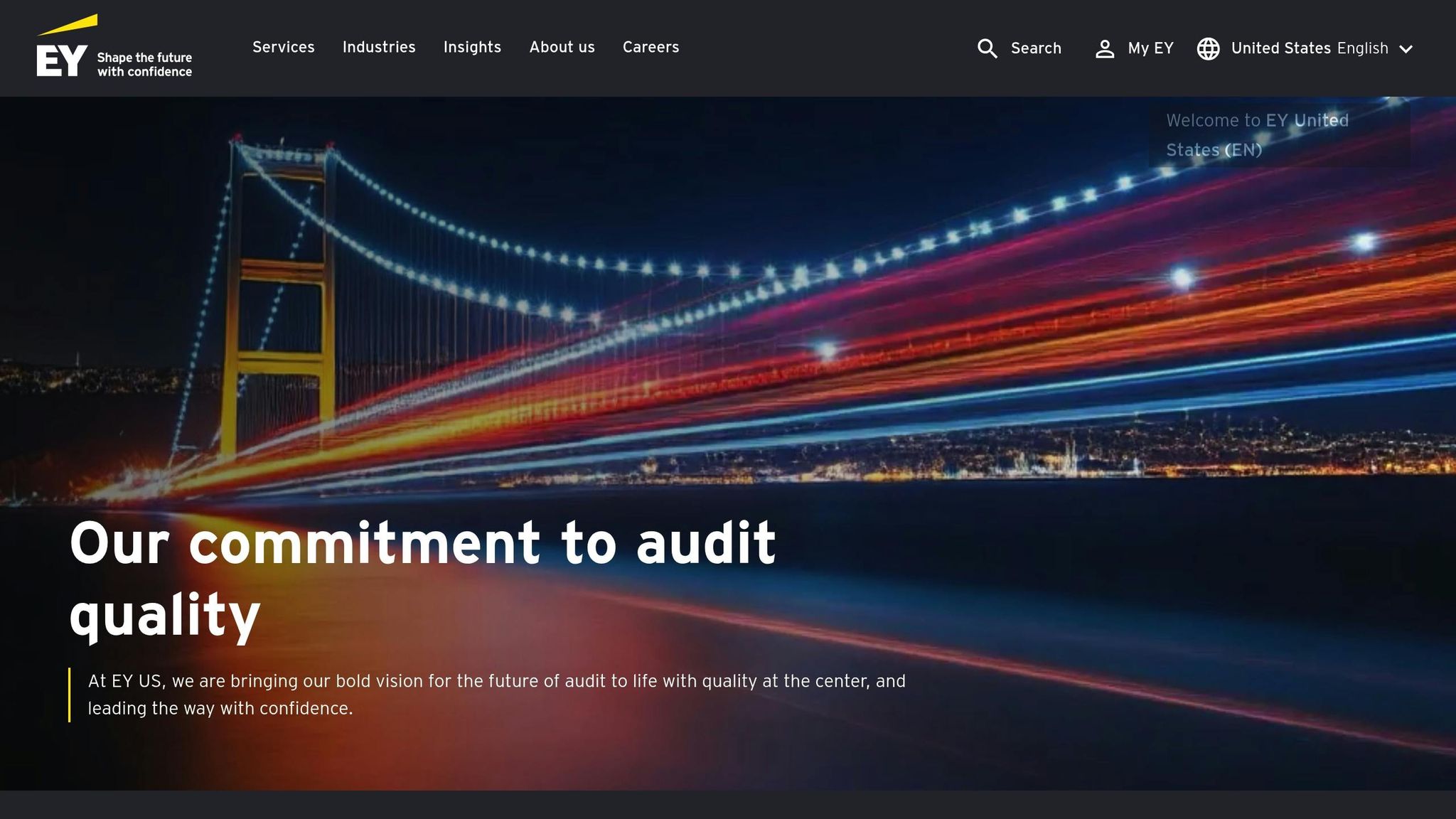
EY operates in more than 150 countries, helping businesses embrace circular economy practices. Similar to firms like PwC, BCG, and Bain, EY focuses on performance measurement and delivering results. By combining technical know-how with hands-on support, EY ensures U.S. businesses can adopt sustainable strategies that are both effective and profitable. The firm blends global insights with local expertise to drive meaningful change.
Circular Economy Expertise
EY's circular economy consulting integrates proprietary tools and global benchmarks to create models that optimize resource use and generate new revenue opportunities. Their approach incorporates circularity into corporate strategies by leveraging established industry frameworks and best practices from around the world.
To track progress, EY uses tools like the Ellen MacArthur Foundation's Circularity Indicators and Global Reporting Initiative standards. These tools measure resource efficiency, waste reduction, and the financial gains of circular initiatives, allowing businesses to showcase tangible results from their sustainability efforts.
Industry Focus Areas
EY works across industries like manufacturing, consumer goods, retail, automotive, and energy. They specialize in redesigning supply chains, implementing closed-loop recycling systems, and introducing product-as-a-service models. For example, in the electronics sector, EY has developed service-based product offerings, while in manufacturing, they’ve implemented recycling systems that reduce costs and improve environmental impact. These efforts also enhance brand reputation and align with growing consumer demand for sustainable practices.
Geographic Presence
With offices throughout the United States and dedicated sustainability teams, EY is well-equipped to address challenges and opportunities across the country. Their teams combine local market insights with global expertise, tailoring solutions to meet U.S.-specific regulations, market trends, and consumer expectations. This ensures their strategies align with American environmental standards and the increasing demand for transparency in business practices.
Implementation Support
EY offers comprehensive support at every stage of the process, from initial assessments to scaling successful circular initiatives. They create detailed roadmaps, engage stakeholders, and provide tools to measure both progress and impact. By addressing common challenges through structured change management and skill-building, EY ensures that circular strategies are not only implemented effectively but also sustained over time. Their focus on developing internal capabilities within client organizations helps ensure long-term success beyond the consulting engagement.
5. KPMG

KPMG is recognized as one of the Big Four accounting firms, with a strong emphasis on helping businesses adopt sustainability and circular economy practices. By providing robust resources and expertise, KPMG supports U.S. companies in shifting from traditional linear models to more sustainable circular approaches. The firm blends strategic insights with hands-on support to ensure these initiatives deliver tangible results. Here's a closer look at their expertise, industry focus, geographic scope, and implementation capabilities.
Circular Economy Expertise
KPMG's approach to the circular economy is rooted in data and analytics. They use detailed assessments and industry benchmarks to identify opportunities for reducing waste and optimizing resources. By leveraging advanced digital tools, they help businesses map their resource flows and uncover areas where circular strategies can add the most value. This process aligns circular economy initiatives with broader ESG objectives and net-zero goals, helping companies navigate the complexities of transforming their business models. Their methodology includes waste tracking, carbon footprint reduction, and performance monitoring through digital dashboards that compare results against industry standards.
Industry Focus Areas
KPMG tailors its circular economy solutions to several key sectors, including manufacturing, consumer goods, energy, financial services, and technology.
- Manufacturing: They assist in creating closed-loop recycling systems and redesigning supply chains to maximize resource use.
- Consumer Goods: The focus is on reducing packaging waste and improving material recovery rates, delivering both environmental and financial benefits.
- Energy: KPMG develops circular solutions for renewable energy projects and waste-to-energy systems.
- Financial Services: They help institutions design financing products and risk frameworks that incorporate circular economy principles.
This sector-specific approach ensures that solutions are relevant and effective for each industry.
Geographic Presence
KPMG has a strong footprint across the United States, combining local knowledge with global expertise to address the needs of American businesses. Their teams are well-acquainted with both federal and state sustainability regulations, ensuring that circular economy strategies meet all necessary compliance requirements while aligning with market expectations.
Implementation Support
KPMG provides end-to-end support, from the initial assessment phase to full-scale implementation and ongoing monitoring. They work closely with clients and their supply chain partners to drive meaningful change. Challenges such as resistance to change, complex supply chains, and technology integration are addressed through targeted strategies, including change management, risk assessments, and training programs. By tracking key metrics like resource efficiency, waste reduction, and cost savings, KPMG ensures that clients can clearly measure the success and return on investment of their circular economy initiatives.
6. Oakdene Hollins
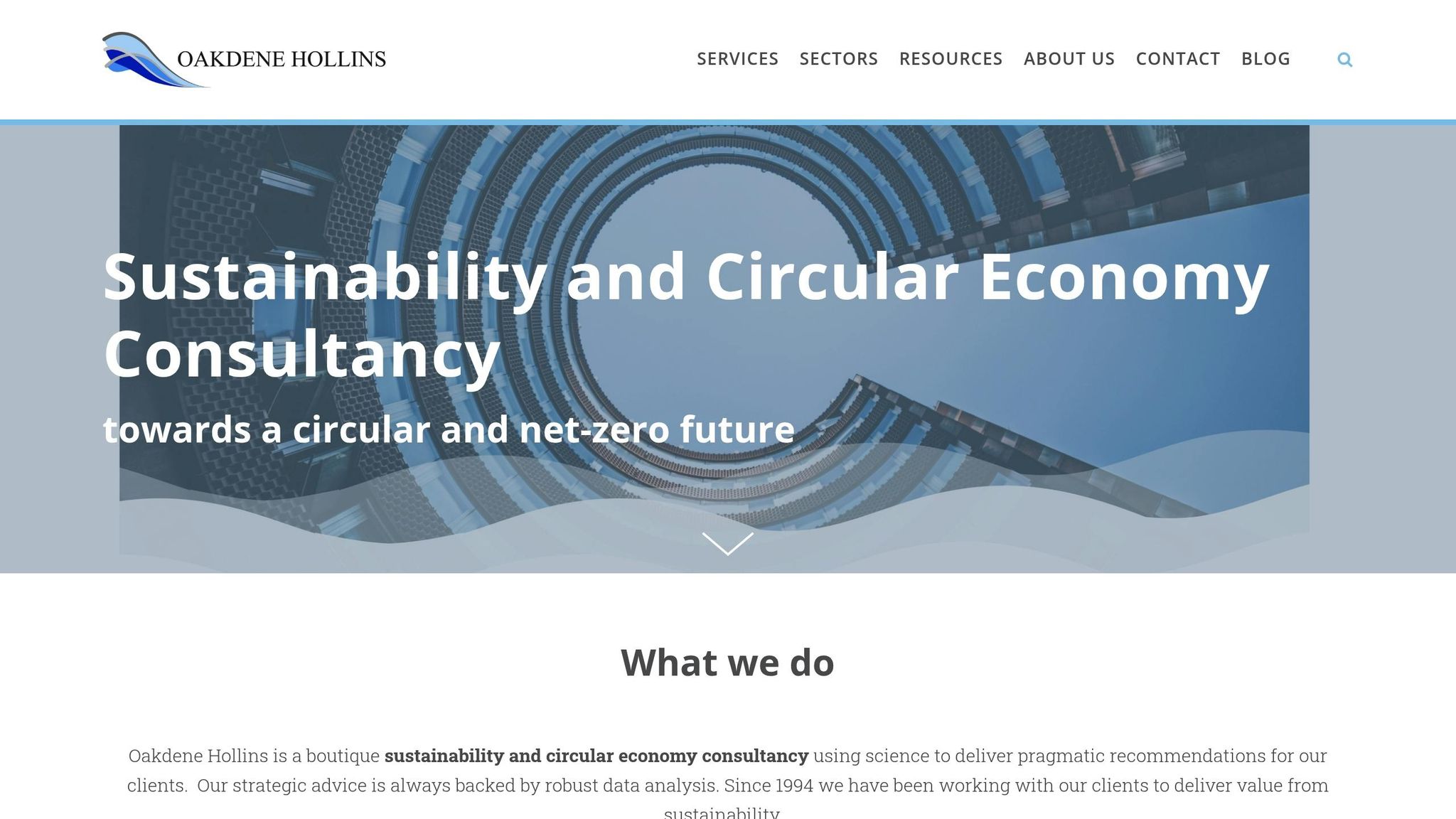
Oakdene Hollins is a boutique consultancy with over 30 years of experience in sustainability, offering science-driven recommendations since 1994. The firm is known for its practical advice, helping businesses shift from traditional linear models to circular ones.
Circular Economy Expertise
Oakdene Hollins focuses on creating closed-loop systems, improving resource efficiency, and developing service-based models like pay-per-use arrangements. Their approach promotes regeneration, ensuring materials are cycled back into production to reduce waste. They also emphasize collaboration, organizing workshops and strategy sessions that bring together suppliers, manufacturers, distributors, and customers to streamline resource use across the entire value chain.
Industry Focus Areas
The company works extensively in manufacturing and supply chain management, redesigning processes to support service-based consumption models. Their industry-specific expertise allows them to tailor solutions for businesses aiming to adopt circular practices.
Geographic Presence
Based in the United Kingdom, Oakdene Hollins has extended its reach globally, including significant work with U.S. businesses. Through strategic partnerships, they navigate diverse regulatory landscapes and market conditions, applying their circular economy knowledge to a variety of contexts.
Implementation Support
Oakdene Hollins offers end-to-end support, from initial assessments to full implementation. They use both quantitative measures (like waste reduction percentages and resource efficiency improvements) and qualitative metrics (such as stakeholder involvement and adoption rates) to track progress. By addressing challenges like organizational resistance, supply chain complexities, and regulatory hurdles, their collaborative workshops ensure tailored solutions. Clients also benefit from direct access to senior consultants throughout every phase of the project.
sbb-itb-97f6a47
7. Circle Economy
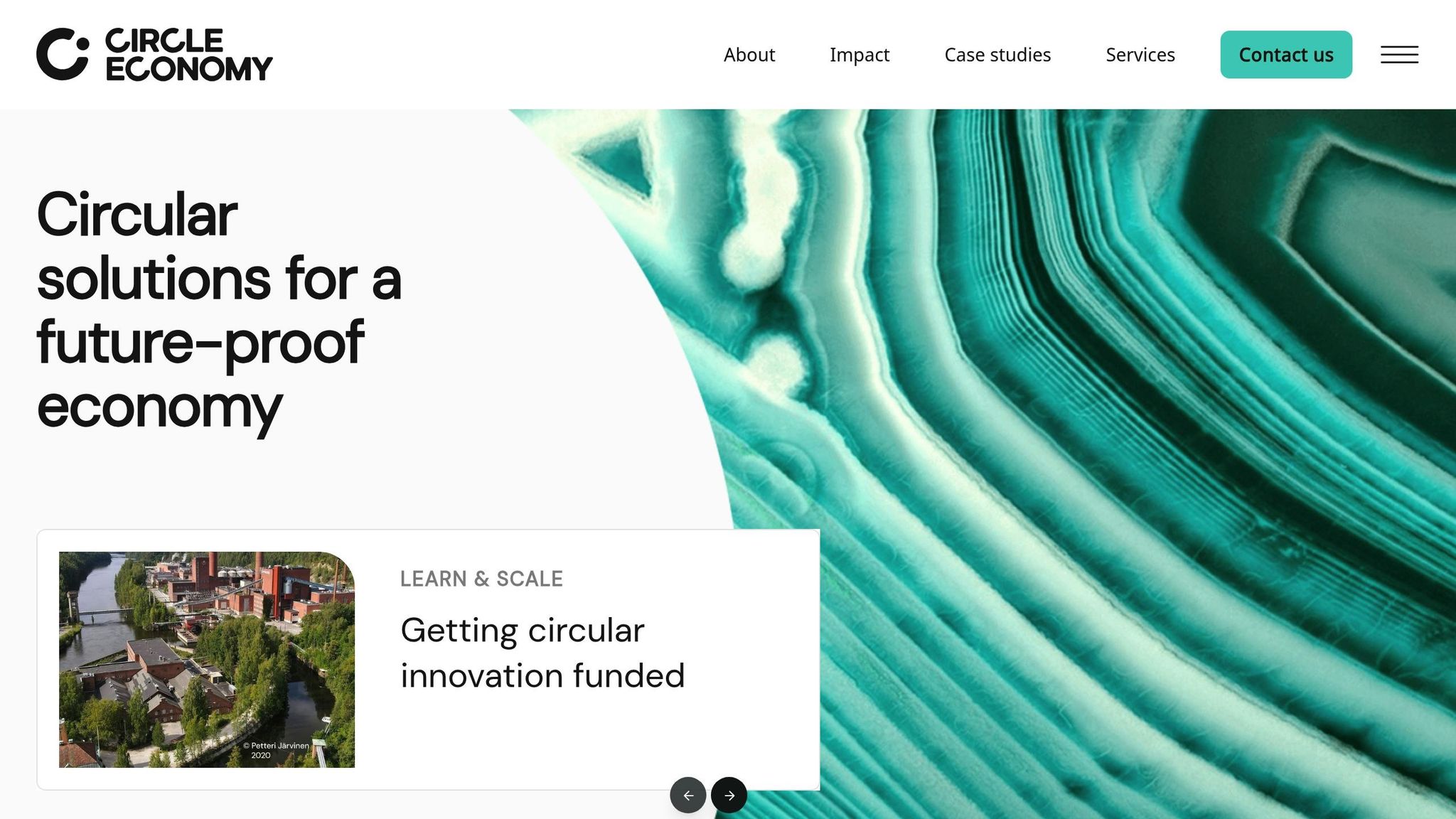
Circle Economy is a non-profit organization and consulting firm based in Amsterdam, committed to advancing the shift toward a circular economy. Their goal? To double global circularity by 2032. By combining scientific analysis with practical solutions, they’ve positioned themselves as a key player in helping businesses and cities worldwide adopt sustainable, circular strategies. Their data-driven methods complement the work of other major consulting firms in this space.
Circular Economy Expertise
At the heart of Circle Economy's work is a focus on measurable, science-backed solutions. They guide organizations in transitioning from traditional linear models to more sustainable circular ones. Their services include evaluating current practices, designing forward-looking circular models, and embedding these principles into corporate strategies and culture.
Circle Economy uses proprietary digital tools to assess and enhance circularity. Their approach ensures practical, actionable results that clients can implement and measure for tangible outcomes.
One of their standout contributions is the Circularity Gap Report, an annual publication that tracks global progress in circular practices. The 2024 report revealed a concerning trend: only 7.2% of the global economy operates on circular principles, a decline from 9.1% in 2018.
Industry Focus Areas
Circle Economy tailors its expertise to industries such as manufacturing, textiles, construction, and food systems. By addressing the unique challenges in these sectors, they create customized roadmaps designed to drive meaningful change.
Their services also adapt to the needs of different-sized organizations. Large corporations benefit from strategies like supply chain overhauls and global transformation plans, while smaller businesses receive targeted support and capacity-building initiatives.
Geographic Presence
Although headquartered in the Netherlands, Circle Economy’s work spans the globe. Their projects touch regions like North America, Europe, and Asia, allowing them to navigate a variety of regulatory environments and market dynamics. Over the years, they’ve collaborated with more than 80 cities and 200 businesses worldwide, solidifying their international presence.
Implementation Support
Circle Economy doesn’t just stop at planning - they’re heavily involved in implementation and follow-through. Using tools like assessment frameworks, business model canvases, and measurement systems, they help clients track progress through material flow analysis and environmental impact assessments.
For example, in 2023, they partnered with the City of Philadelphia to create a Circular City Roadmap. This initiative engaged over 100 local stakeholders and identified 15 actionable projects aimed at diverting 120,000 tons of waste annually and creating 2,500 jobs by 2026. Another notable project was their 2022 collaboration with H&M Group, which increased textile recycling rates by 18% and cut raw material use by 12% in just one year.
Beyond direct projects, Circle Economy supports the adoption of circular practices through workshops, training sessions, and advisory services. They also work with global organizations like the United Nations and the World Economic Forum to promote international standards and best practices in circularity.
8. GATE C
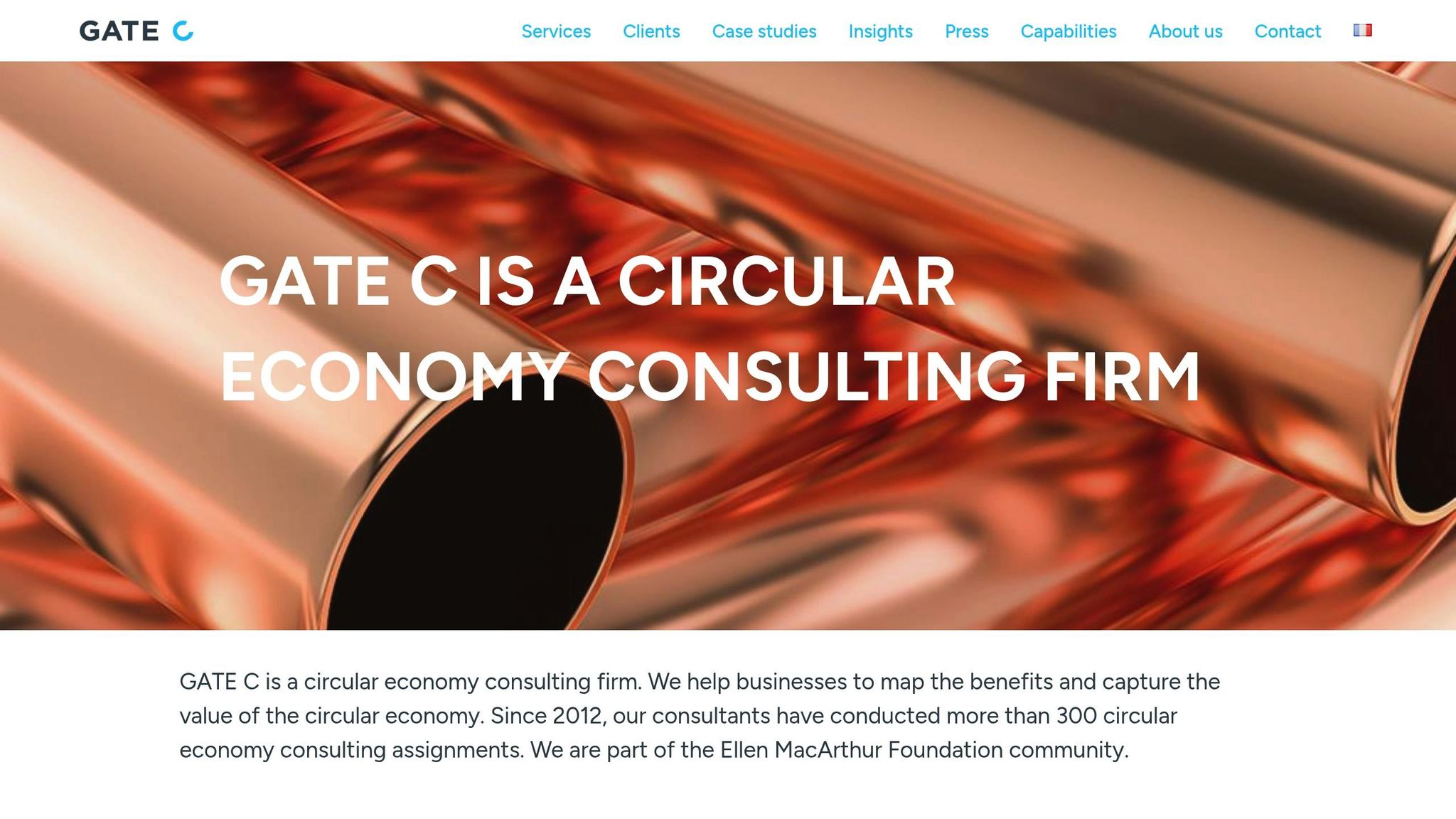
Established in 2012 by Rémy Le Moigne, a former Deloitte partner, GATE C is dedicated exclusively to advancing the circular economy. Over the years, the firm has completed more than 300 consulting projects, earning a reputation for helping businesses shift from traditional linear models to circular systems. In 2025, GATE C was named one of the world's Top 12 Circular Economy Consulting Companies by ClimateSort, a recognition that highlights their specialized skills in this field.
Circular Economy Focus
GATE C specializes in identifying the tangible benefits of circular economy initiatives. Their team works closely with clients to uncover opportunities where circular strategies can deliver measurable improvements in both operational efficiency and environmental impact. As a member of the Ellen MacArthur Foundation community, GATE C stays at the forefront of global research and best practices in circularity.
Global Reach
Although based in France, GATE C serves clients worldwide, including businesses in the United States. Their extensive international experience allows them to tailor circular economy strategies to fit different regulatory frameworks and market conditions, ensuring solutions that align with local needs while leveraging global insights.
Comprehensive Support
GATE C provides end-to-end support for businesses undergoing circular economy transformations. From the initial assessment to full strategy implementation, they use a data-driven approach to measure outcomes like improved resource efficiency, waste reduction, and financial gains. This methodology helps businesses not only track their progress but also build a strong case for their investments in circular initiatives.
9. Closed Loop
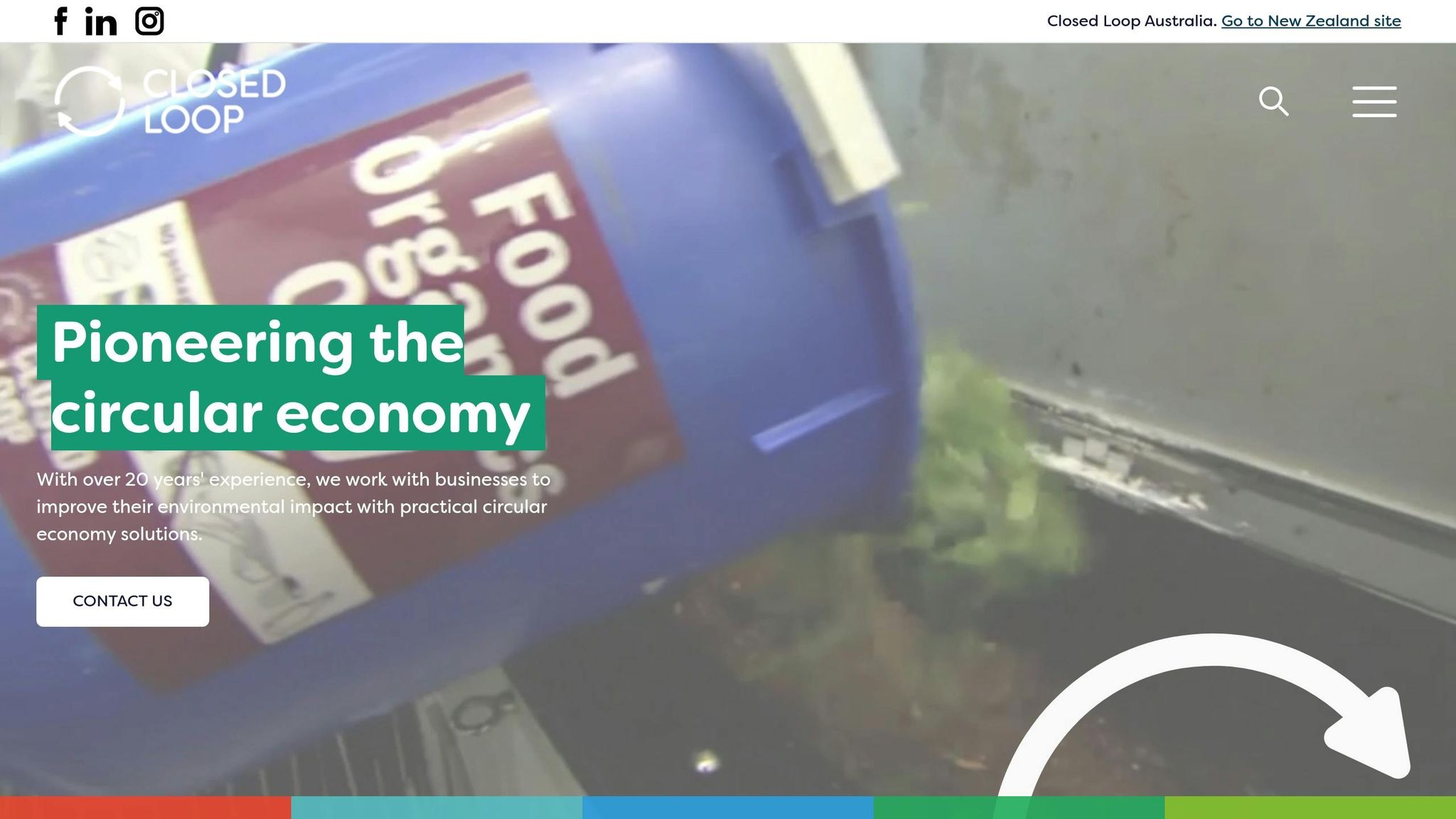
Headquartered in Melbourne, Australia, Closed Loop has been driving circular economy solutions for over two decades. The company has carved out a reputation as a leader in transforming traditional waste-heavy operations into resource-efficient, circular systems. Its work spans both Australian and international markets, helping businesses reduce waste and improve resource use.
Circular Economy Solutions
Closed Loop designs customized strategies to turn waste into valuable resources. By conducting thorough assessments and delivering measurable outcomes, the company helps businesses identify opportunities that align with their sustainability goals and operational priorities.
Key Industry Expertise
Closed Loop supports a variety of industries, with a strong focus on sectors that produce significant waste or require innovative packaging solutions. Its expertise shines in food service, retail, and manufacturing, where it offers compostable, recyclable, and reusable packaging options. These solutions not only improve customer experience but also reduce environmental impact and ensure compliance with local regulations.
Global Reach
Although based in Melbourne, Closed Loop extends its services beyond Australia, offering solutions tailored to diverse regulatory landscapes and market needs. With a network of technology partners and collection services, the company ensures its circular strategies are effectively implemented, whether for local clients or international businesses.
Comprehensive Support
Closed Loop provides full-service support, guiding businesses through every step of their transition to circular systems. From initial waste assessments to implementing sustainable packaging and monitoring outcomes, the company uses key performance indicators like waste diversion, resource recovery, and reductions in single-use packaging to track progress. Its partnerships with technology providers enable scalable and efficient implementation.
10. Top Consulting Firms Directory
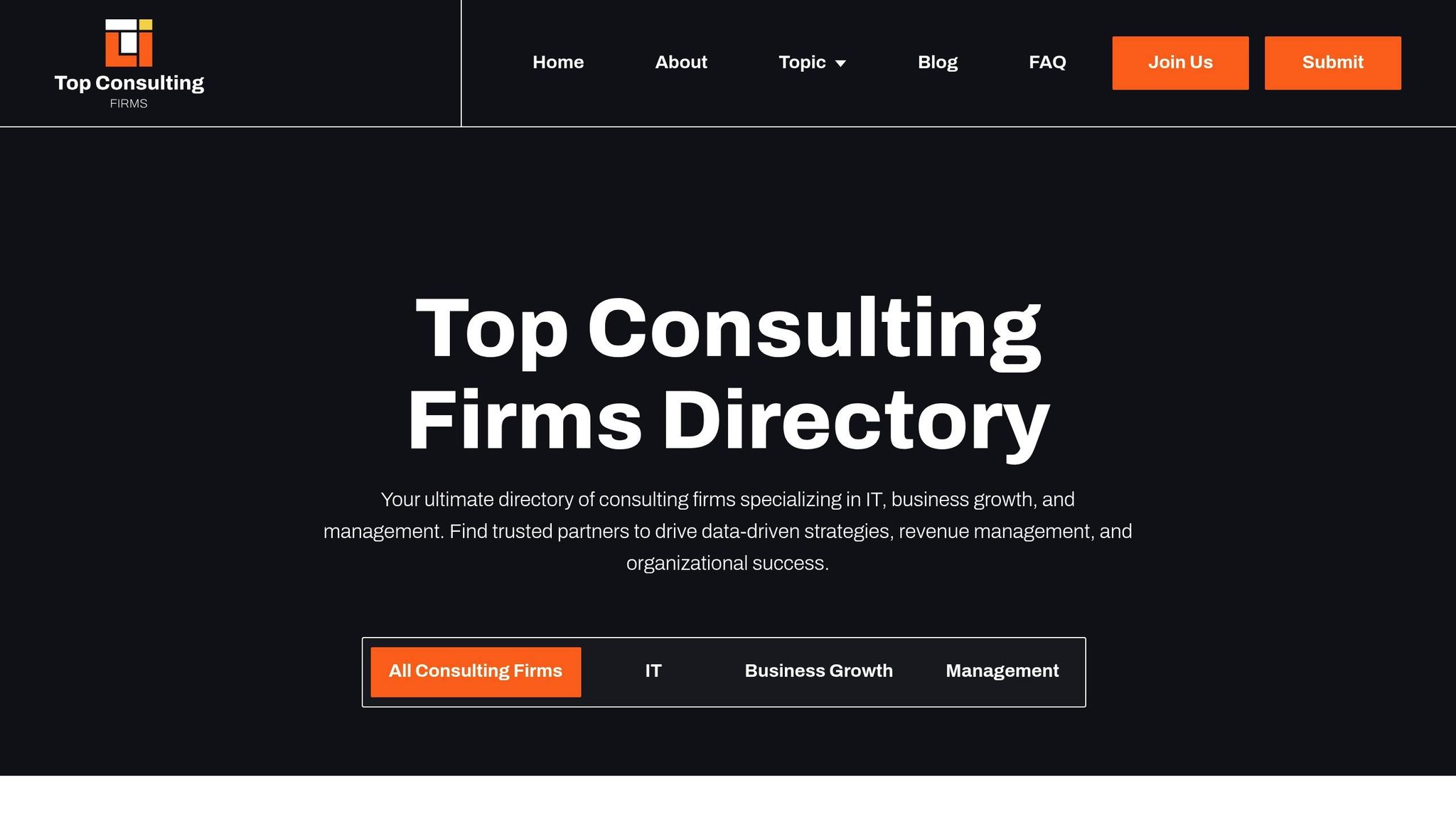
The Top Consulting Firms Directory serves as a valuable resource for businesses seeking expert guidance in sustainable transformation. It connects companies with leading consultants specializing in circular economy practices and other sustainability-focused solutions.
Circular Economy Expertise
The Directory features a selection of firms well-versed in designing closed-loop systems and sustainable business models. These firms are chosen based on their proven track records, detailed case studies, and published insights into best practices and emerging trends. The platform is consistently updated to reflect new developments, such as advancements in digital transformation and innovative business models related to circularity.
Industry Focus Areas
The Directory caters to a wide array of industries, ensuring tailored expertise for specific sector challenges:
- Manufacturing: Specialists in closed-loop production systems.
- Consumer Packaged Goods: Experts in sustainable packaging solutions.
- Food and Beverage: Consultants experienced in waste-to-resource initiatives.
- Fashion: Advisors skilled in applying circular design principles.
Additionally, the technology and life sciences sectors are well-supported. Firms in these areas offer expertise in biosolutions for water treatment and circular strategies for electronics design. This comprehensive coverage allows businesses in nearly any industry to find consultants with the right experience to address their unique challenges.
Geographic Presence
The Directory includes both U.S.-based and global consulting firms, ensuring support for businesses operating domestically or internationally. Many firms maintain offices in major U.S. cities, providing insights into local market dynamics, regulations, and cultural considerations. For companies with a global footprint, the Directory also lists consultancies capable of managing projects across multiple regions while staying aligned with local requirements.
Implementation Support
Firms listed in the Directory provide comprehensive, end-to-end services. This includes everything from initial assessments and supply chain redesign to ongoing implementation and strategy refinements. Their work delivers measurable results, such as turning over 1 million plastic bottles and 500 billboards into reusable products - a feat achieved by Hamilton Perkins Collection for brands like National Geographic and Paramount Pictures.
Firm Comparison Table
To help you make an informed decision, here’s a breakdown of how each firm stands out in circular economy consulting:
| Firm | Circular Economy Expertise | Industry Focus | Geographic Reach | Implementation Support |
|---|---|---|---|---|
| PwC | Strategy, transformation, scaling solutions | Broad coverage across all major industries | Global presence with strong U.S. operations | High-level support, especially for large organizations |
| BCG | Proprietary Circelligence platform, digital tools | Manufacturing, technology, consumer goods | Global network with extensive U.S. coverage | End-to-end strategy to execution support |
| Bain & Company | Measurable impact focus, change management | Consumer goods, industrial, retail | 65 cities across 40 countries including major U.S. markets | Comprehensive implementation and transformation |
| EY | Risk assessment, compliance, transformation | Energy, finance, manufacturing, public sector | Global reach with significant U.S. presence | Strong compliance and reporting support |
| KPMG | Audit integration, circular strategy development | Public and private sectors, finance | Worldwide coverage including extensive U.S. operations | High-level reporting and risk management |
| Oakdene Hollins | Science-based closed-loop systems (since 1994) | Manufacturing, packaging, service models | UK/EU based, serves global clients | High hands-on implementation |
| Circle Economy | Systems change, collaborative frameworks | Cities, textiles, food systems | Netherlands headquarters, global project reach | Strong collaborative support |
| GATE C | Value mapping, 300+ completed assignments | Manufacturing, logistics, food service | France-based with global client coverage | Very high project delivery focus |
| Closed Loop | Waste transformation, 20+ years experience | Food packaging, retail, waste management | Australia/APAC base, international services | Very high custom solution development |
Global vs. Boutique Trade-offs
Global firms like PwC, BCG, Bain & Company, EY, and KPMG shine when you need broad industry coverage, access to extensive resources, and the ability to scale solutions across multinational operations. They’re ideal for companies operating in multiple markets or those looking to integrate circular economy strategies into broader organizational transformations.
On the other hand, boutique firms such as Oakdene Hollins, GATE C, and Closed Loop offer highly tailored solutions. For example, GATE C has completed over 300 circular economy assignments since 2012, showcasing their deep expertise in this niche area. These smaller firms tend to be more agile, often delivering faster results and customized strategies for specific challenges.
Geographic Considerations for U.S. Companies
International boutique firms frequently collaborate with local partners or adjust their methods to align with U.S. standards, including currency formats, measurement units, and environmental regulations. This adaptability ensures their solutions remain practical and relevant for American businesses.
Depth of Implementation Support
The level of implementation support varies greatly between global and boutique firms. Boutique consultancies often excel at moving quickly from strategy to execution, offering hands-on support throughout the project. Their sector-specific focus allows them to deliver practical, actionable results.
Global firms, while more focused on strategic transformation and scaling, still provide strong implementation support for large-scale changes. For instance, BCG’s Circelligence platform integrates digital tools to help corporations assess and accelerate circularity efforts across their operations.
Cost and Resource Considerations
Global firms typically require larger budgets due to their expansive reach and resources. In contrast, boutique firms often provide more cost-effective solutions while maintaining a high level of expertise and customization.
Ultimately, your choice depends on the complexity, scale, and geographic scope of your project. Whether you need specialized technical expertise or a broader organizational transformation, this comparison equips you to select a partner that aligns with your sustainability goals and operational needs.
Conclusion
When it comes to advancing toward a more sustainable and circular future, picking the right consulting partner is a crucial step. The success of your circular economy initiative often hinges on this decision. Since these projects require specialized knowledge in areas like resource optimization, closed-loop systems, and sustainable business strategies, not all consulting firms are equipped to handle such challenges effectively.
The right partner depends on your project's scope and unique needs. For multinational corporations aiming to implement circular principles across multiple markets, global firms such as PwC, Boston Consulting Group (BCG), or Bain & Company are strong options. Their expansive networks and broad industry expertise make them ideal for large-scale, complex transformations.
On the other hand, if your project requires specialized, in-depth knowledge, boutique firms might be a better fit. These firms often excel in niche areas, as demonstrated by GATE C's track record of successful projects. Similarly, Oakdene Hollins has helped clients adopt closed-loop systems that reduce waste and enhance resource efficiency.
When evaluating consulting firms, look for those that emphasize data-driven strategies and measurable results. Top firms will provide clear metrics for resource savings, waste reduction, and financial outcomes, ensuring transparency and enabling informed decisions.
Before committing, take time to review case studies, client feedback, and the firm's approach to solving challenges. Starting with a pilot project can also help you gauge their ability to address your industry-specific needs and deliver tailored solutions.
For a curated list of firms with expertise in circular economy projects, check out the Top Consulting Firms Directory. Whether you opt for a global leader or a boutique specialist, choose a partner that aligns with your sustainability goals and can deliver tangible, measurable outcomes.
FAQs
Should I work with a global consulting firm or a boutique consultancy for my circular economy project?
Choosing between a global consulting firm and a boutique consultancy comes down to your project’s unique requirements, budget, and objectives.
Global consulting firms are known for their vast resources, wide-ranging expertise, and experience across multiple industries. This makes them a strong choice for large-scale or highly complex projects that require a diverse skill set and extensive support.
In contrast, boutique consultancies excel in offering specialized knowledge, a more personalized approach, and greater flexibility. They’re often a better match for niche projects or initiatives that demand focused expertise and a tailored strategy.
To make the right choice, think about the size and scope of your project, how much customization you need, and whether industry-specific expertise is a priority. If you’re looking for a highly specialized and hands-on approach, a boutique consultancy might be your best option. But if your project involves broader strategies and requires a wide array of resources, a global firm could be the better fit.
What are the key advantages of working with a consulting firm to adopt a circular economy model?
Partnering with a consulting firm to shift toward a circular economy model can open up a range of opportunities for businesses. These firms specialize in creating strategies tailored to reduce waste, improve resource use, and develop business practices that align with environmental goals.
They also help companies uncover ways to cut costs, such as lowering material expenses, streamlining supply chains, and exploring new revenue opportunities. On top of that, consulting firms offer guidance to ensure businesses comply with regulations and enhance their reputation by showcasing a commitment to sustainability. With their help, businesses can aim for steady growth while making a positive impact on the planet.
What metrics do consulting firms use to evaluate the success of circular economy projects?
Consulting firms often rely on a variety of key performance indicators (KPIs) to evaluate the effectiveness of circular economy projects. Common metrics include waste reduction, resource efficiency, and cost savings. For example, they might analyze the percentage of materials that are recycled or reused, track decreases in raw material usage, or calculate financial savings achieved through better resource management.
Firms may also monitor carbon footprint reductions, energy efficiency gains, and customer satisfaction levels to assess the broader environmental and economic outcomes. These measurements not only highlight the practical advantages of circular economy efforts but also reveal opportunities for further refinement and growth.

